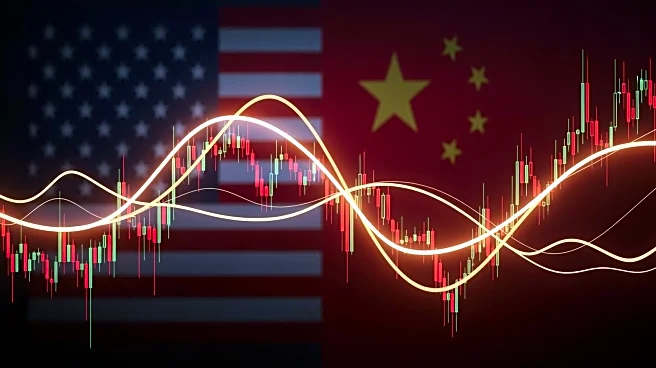What's Happening?
U.S. Treasury yields experienced minor fluctuations on Wednesday as investors closely monitored developments in the ongoing trade conflict between the United States and China. The 10-year Treasury yield fell slightly to 4.021%, while the 2-year Treasury yield saw
a marginal increase to 3.483%. The 30-year Treasury bond yield decreased by one basis point to 4.614%. These changes come amid heightened tensions, with President Trump threatening China with a cooking oil embargo due to Beijing's reluctance to purchase U.S. soybeans. In response, China imposed new sanctions on five U.S. subsidiaries of South Korean shipbuilder Hanwha Ocean. Additionally, the U.S. government shutdown has reached its 15th day, causing delays in the release of key economic data, including the core CPI print for September.
Why It's Important?
The slight changes in Treasury yields reflect investor uncertainty amid escalating trade tensions between the U.S. and China. These developments could have significant implications for global trade and economic stability. The ongoing government shutdown further complicates the situation by delaying critical economic data releases, which are essential for informed decision-making by investors and policymakers. The trade conflict and data blackout could impact market confidence, potentially affecting investment strategies and economic forecasts. Stakeholders in industries reliant on international trade, such as agriculture and manufacturing, may face challenges due to the tariffs and embargoes, influencing their operations and profitability.
What's Next?
Investors and policymakers will continue to monitor the situation closely, with potential further retaliatory measures from both the U.S. and China. The scheduled release of the CPI print on October 24, despite the shutdown, will be a critical data point for assessing inflation and economic health. Market participants may adjust their strategies based on these developments, while businesses affected by the trade conflict may seek alternative markets or strategies to mitigate risks. The resolution of the government shutdown will also be crucial in restoring the flow of economic data and stabilizing market conditions.
Beyond the Headlines
The trade tensions and government shutdown highlight broader issues in U.S. economic policy and international relations. The reliance on tariffs and embargoes as negotiation tools may have long-term effects on diplomatic relations and global trade norms. Additionally, the shutdown underscores vulnerabilities in government operations and the potential impact on economic data transparency and reliability. These factors could influence future policy decisions and international trade agreements, shaping the economic landscape for years to come.
















